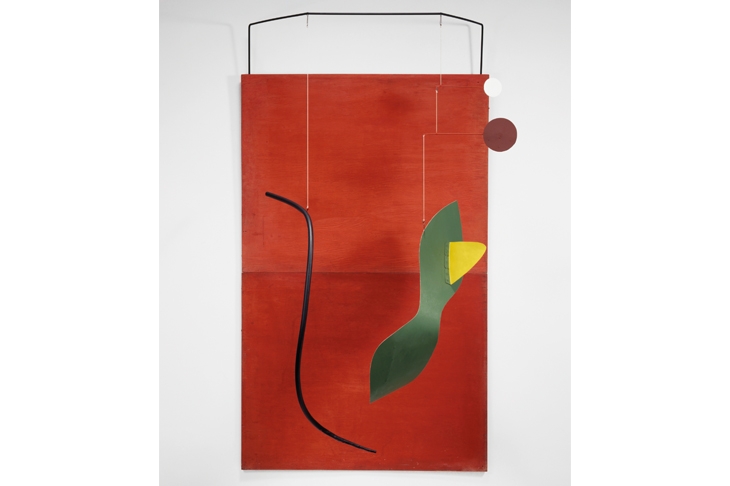‘Mid-century modern’ is the useful term popularised by Cara Greenberg’s 1984 book of that title. The United States, the civilisation that turned PR and branding into art forms, wanted homegrown creative heroes. In design there were Charles Eames and George Nelson with their homey hopsack suits and wash’n’wear shirts, their sensible Wasp homilies: a counterattack against imported — and often baffling — exotics from the Bauhaus.
It was the same in fine art. Jackson Pollock (Jack the Dripper) was a roughneck from cowboy country in Wyoming who became a darling of the media, not least because of his readily reportable deplorable behaviour. And then there was Alexander Calder, not a hard-scrabble survivor at all, but born in Philadelphia to a family of artists.
True, they were doggedly traditional artists with a record of humdrum paintings and lumpen sculpture, but Calder’s parents had, importantly, spent time in Paris. Referring to his life in art, Calder neatly said: ‘I wasn’t brought up, I was framed.’ To mid-century America, Pollock and Calder seemed importantly different to Kline, Rothko and Gorky. They were distinctively American.
The first volume of Jed Perl’s ambitious study, the very first Calder biography, ends in 1940, long before mid-century modern became an identifiable style label, but offers splendid, meticulous research into Calder’s singular life-in-art. It’s a solid brick in the monument to Calder’s heroic stature.
Yet perhaps it is too slavishly respectful a treatment. At mid-century, American artists and critics were in a mythologising lockstep to create a self-elected elite. The equivalent in literature to Clement Greenberg’s and Harold Rosenberg’s grip on art criticism was the literary cadre described in Norman Podhoretz’s gruesomely embarrassing 1967 confessional Making It.
Calder studied engineering and worked for Edison before diverting to New York’s Art Students’ League, then found himself on ancestral turf in Paris in 1926. Despite the Hemingway-generated mythology, there were relatively few American artists in France between the wars; and in Montparnasse, Calder soon met Duchamp, Léger, Sartre and Mondrian, as you did. For the latter, he had a special regard.
A Serbian shopkeeper encouraged him to make mechanical toys and this was the origin of Le Cirque Calder, the animatronic assembly (of, for example, dogs jumping through hoops) that was the source of his art and the basis of his myth. Then Calder moved towards abstraction. In 1931, Duchamp coined the term ‘mobiles’ to describe an art form where primary-coloured metal shapes connected by wires are delicately balanced and moved by currents of air to create delightful effects.
Perl’s argument is: here’s the beginning of a new type of sculpture, dematerialised and beyond tradition, the plastic counterpart of ee cummings’s poetry. Calder had no theory, his art was simply to be enjoyed; and in this devotion to the pleasure principle there is the connection to consumerism. By the 1950s, you could find smart Manhattan furniture stores selling Calderesque sconces and standard lamps made of squiggly wire.
But what of Le Cirque? It was inspired by the Humpty Dumpty Toy Circus, a toy made by Schoenhut, a Philadelphian manufacturer. It was demonstrated to Calder’s circle while Mrs Calder cranked a 78 rpm record on a Victrola. When dogs had stopped jumping through hoops, little tin men fell off circus horses in jerky movements.
But is this not unbearably cute? True, ee cummings and Edmund Wilson were Calder contemporaries who intellectualised about the circus, and Picasso enjoyed his weepy saltimbanques, but surely this is the very definition of lowbrow: an art form that requires no interpretative effort from the viewer.
I have lived with some Calders. A friend once owned one of Mies van der Rohe’s mid-century Lake Shore Drive apartments in Chicago where I occasionally stayed. I found the Calder mobile in the bathroom amusing at first, but soon an annoying distraction. Then there is La Colombe d’Or hotel in Saint Paul de Vence, the favourite Provençal celebrity petting zoo, where you find a Calder by the pool, making tinkling noises while you sip rosé. This seems frivolously correct.
Jed Perl is an impressively serious reviewer in the New York Review of Books (sometimes known as The New York Review of Eachother’s Books). He’s not someone you would expect to develop a radical re-interpretation of an American hero. And the enormous heft and patrician design of the book (beautifully printed in Germany) are curiously at odds with Calder’s light and amusing art.
Calder is one of the most instantly recognisable artists, as if he were a premium-branded product. Indeed, the connection between his best known work and product design may be the conceptual glue that binds mid-century modern into a quintessentially American whole: Calder was as happy making jewellery and toys as mobiles. Personally, I think he peaked when decorating a Douglas DC-8 jetliner for Braniff in 1972 and a BMW 3.0 CSL for BMW’s Art Cars programme in 1975.
As Richard Dorment once noted, the delightful mobiles apart, Calder’s other sculpture and painting are ‘not quite first rate’. Meanwhile, confirming an affinity with water, a Calder hangs over the pool in the restaurant of New York’s Seagram building, scriptural home of that other mid-century modern phenomenon: the power lunch.






Comments